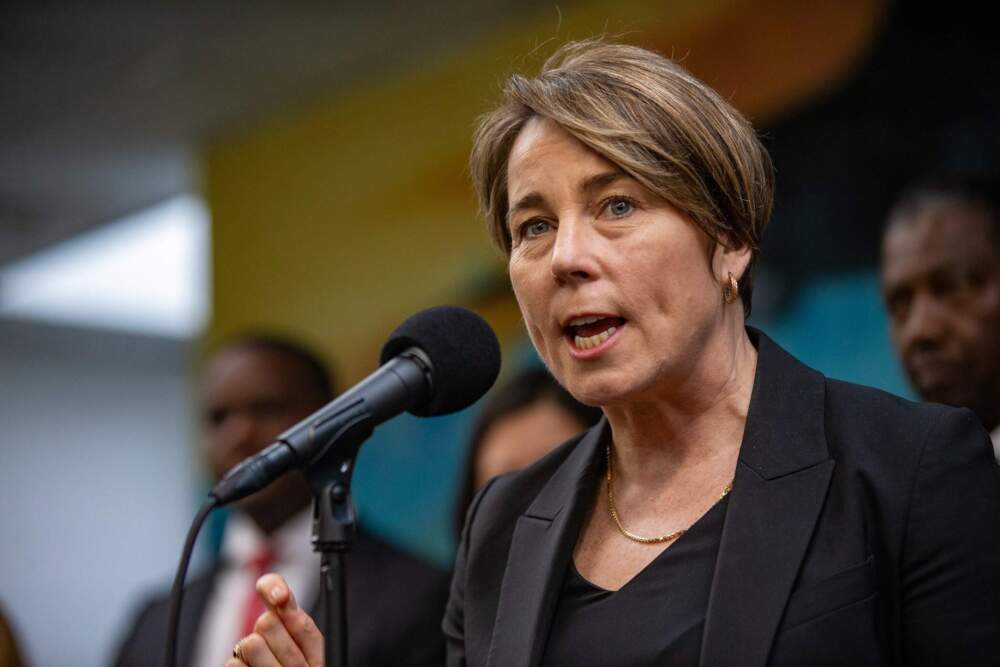Advertisement
Healey places new limits on emergency family shelter program

Massachusetts is putting further limits on access to emergency shelter for families experiencing homelessness and changing how it prioritizes applicants on the program's waitlist. Among those moving to the front of the line are families of veterans and those forced out of their homes through no-fault evictions.
Some people staying at overflow shelters will now be limited to five days under the new edict.
The changes come as the state faces continued financial pressure to maintain its family shelter system, according to a statement from Gov. Maura Healey's office announcing the changes. Massachusetts guarantees shelter to eligible families with children and pregnant women, but the arrival of thousands of new immigrants has led the state to limit shelter services.
"We have been saying for months now that the rapid growth of our Emergency Assistance shelter system is not sustainable," Healey said in the statement. "Massachusetts is out of shelter space, and we simply cannot afford the current size of this system."
Under the new plan, families that meet the following criteria will get priority placement in a shelter:
- Were given a no-fault eviction
- Had a "sudden or unusual circumstances in Massachusetts beyond their control, such as a flood or fire"
- At least one family member is a veteran
- Have medical needs
- Have newborn children
- Are at risk of domestic violence
Those who do not meet one of the criteria can go to what the state is now calling "temporary respite centers," but they will only be able to remain there for five days, according to Healey's office. The centers are located in Chelsea, Lexington, Cambridge and Norfolk, sites previously used as overflow shelters with 30-day stay limits.
"The administration will not be opening additional respite center sites due to operational and financial constraints," the statement said.
Families that stay at a respite center will have to wait "six months or more" before they can get a spot in an emergency shelter, according to the statement. The Healey administration said those families can still avail themselves of other forms of state assistance, including the HomeBASE program, which provides some families with a two-year stipend for housing-related expenses.
The changes to the family shelter program will take affect Aug. 1, according to the administration. Families already in line for a shelter unit will not be affected by the changes.
Some advocates said they had no advance warning of the rule changes. Kelly Turley of the Massachusetts Coalition for the Homeless said, "We anticipate that over the course of the next year, thousands of families will be impacted by this policy." She noted that five days isn't much time for people to find alternative housing.
The state has struggled to keep up with exploding demand for space in its emergency shelter system over the last few years. Citing the skyrocketing costs of maintaining the program, Healey last year capped the number of families that could be housed at any given time at 7,500. Other families would be placed on a waitlist and try to make due with other options, like temporary shelters run by municipalities and nonprofits.
Advertisement
This year, the state implemented a nine-month limit on how long families could stay in an emergency shelter unit, providing them with a tight window to find more stable housing. Temporary shelter stays were limited to 30 days, and this summer, the state told families they could no longer stay at Logan Airport, where dozens of people had been taking refuge. A delegation from Massachusetts traveled to the southern border last month to notify migrants that the state's shelters are full.
The Healey administration also has begun offering to pay for families' travel to other states if they have friends or family members who can help them.
The administration has harshly criticized what it calls inaction on the part of the federal government to address work visas and other needs for new immigrants, which can force these families to seek shelter. To help more families leave the shelter system, the state is providing English language lessons, help navigating housing applications and other assistance, including job placement.
"Since November 2023, the administration has helped nearly 3,800 immigrants apply for work authorizations, the vast majority of which have been approved," the administration said, and nearly 1,250 have been enrolled in English classes. Across the system, nearly 1,300 Emergency Assistance residents have gotten jobs, according to the state.
This article was originally published on July 23, 2024.


